

I became interested in history at an early age. It was the summer of 1976, the year of the Bicentennial, and my young world was filled with parades, block parties and decorating neighborhood fire hydrants with red, white and blue paint. Keeping with the celebratory spirit, my parents planned a historically-themed vacation highlighting famous sites from Colonial and Revolutionary America. My most vivid memories are from our drive through Virginia, where we stopped at Monticello, Jamestown and Williamsburg. As a four-year-old, I had the most fun running through the battlefield at Yorktown as I played hide-and-seek with my father. Our family still has an old photograph from one of those days: My dad standing next to me as I sat smiling on a bronze cannon, wearing pigtails and a striped shirt. I did not realize at the time that this introduction to early America would develop into a life-long love of History and a rewarding career as an educator.
My appreciation for history deepened as I made the journey through high school, college and graduate school where inspiring faculty taught me about our world and its complex, yet fascinating, past. They taught me how to ask questions about the past, evaluate information and examine my assumptions. Following the example of these talented teachers and professors, I chose a career in education so that I could share my excitement about history with future generations. I am happy to say that my choice has been a rewarding one, as I have met thousands of inspiring and talented students who keep my love of teaching alive.
About a decade ago, however, I began to realize that the number of students expressing a desire to be history majors was declining. This trend was not specific to Waubonsee, or even to Illinois, but was common throughout the entire country. More and more students were choosing careers in fields outside of history—and even outside of the more general category of liberal arts. I was pleased that these fields, many of which were connected to STEM education, were providing students with opportunities for rewarding careers. I couldn’t help but grow concerned, however, about the relevance of my discipline. I wondered if history still had a future.
I have always known that history is a valuable subject that teaches us how to interpret information and think critically. It is not merely about memorizing facts and dates, but more about providing us—all of us—with a better understanding of ourselves and the world in which we live. Over the past several years I have realized that I need to relay this message more explicitly to my students. They need to understand that history will equip them with knowledge and skills that will not only help them succeed today but will also prepare them for the future. Skills such as analysis, communication and collaboration are taught in history and will be useful in any profession, whether it falls under the label of liberal arts, STEM, health care, or technical careers. They will learn in history how to evaluate information to determine its value and credibility. This skill is so important in a world where we have access to all kinds of information, at all times of day, from a seemingly unlimited number of places.
I have not given up on my mission to inspire a love for history among my students. In fact, I continue to see it every day. I see students’ faces light up when they make connections between events in the past and today. I watch them react with surprise when they discover that their own communities in Northern Illinois have a fascinating story and that their neighborhoods, local institutions, and even ancestors have played an important role in history. I treasure these moments, knowing that I am doing my part to prepare them for a rewarding future. It is at these times that I think back to the excitement of that four-year-old girl who embarked on a life-long journey of discovery. It is also at these times that I know history does indeed have a future.
Visit www.waubonsee.edu/history to learn more about Waubonsee’s History Program.

